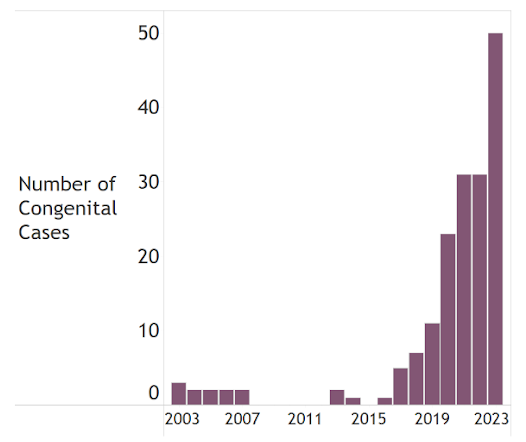Syphilis and pregnancy
Last updated January 14, 2025

Syphilis in newborns is known as congenital syphilis. Congenital syphilis happens when untreated syphilis passes to a fetus during pregnancy.
Congenital syphilis can lead to miscarriage, stillbirth, preterm delivery, long-term medical conditions, and even infant death. Some babies with syphilis can be healthy at birth, but develop serious complications later in life.
Congenital syphilis is increasing in Colorado

From 2018 to 2023, congenital syphilis cases increased more than seven times in Colorado (seven cases in 2018 to 50 cases in 2023).
Data from 2023 is preliminary. Additional data will be available when it is finalized. For questions about syphilis data, use CDPHE’s data request form.
What can I do to protect myself and my baby?
- Make sure to request a comprehensive sexually transmitted infection (STI) test panel screening at your first prenatal visit. This panel includes syphilis testing.
- If you test positive for syphilis, get treatment right away.
- If you are pregnant and have syphilis, you can still reduce the risks of passing syphilis to your baby. Getting tested and treated for syphilis can prevent serious health complications for both you and your baby.
- Prenatal care is essential to the overall health and wellness of you and your child. The sooner you begin receiving medical care during pregnancy, the better the health outcomes will be for you and your baby.
- Talk to your partner(s) about getting tested. If your partner has syphilis, you could get infected or reinfected, even if you have already been treated for syphilis.
- Use condoms during sexual intercourse.
- Remember that it’s possible to get syphilis and not know it. Sometimes the infection causes no symptoms, only very mild symptoms, or symptoms that look like other illnesses.
- Talk with your doctor about your risk for syphilis. Have an open and honest conversation about your sexual history and STI testing. Your doctor can give you the best advice on any testing and treatment that you may need.
Syphilis testing and the law
Colorado law requires health care providers to offer syphilis testing to anyone who is pregnant.
Regulation 12 of 6 CCR 1009-1: Epidemic and Communicable Disease Control went into effect January 14, 2025, and requires licensed medical professionals and all health care facilities, like hospitals, urgent care clinics, community health clinics, freestanding emergency departments, medical offices, and correctional facilities to provide services to stop the spread of syphilis in the state, particularly among those who are pregnant.
- The rule requires all health care facilities and medical providers who care for anyone who is pregnant to offer syphilis testing. Testing is required at specific points throughout pregnancy, including: During the first trimester of pregnancy or at the patient’s initial prenatal visit.
- During the third trimester of pregnancy (between 28 - 32 weeks).
- At the time of delivery.
- When there is a miscarriage after 20 weeks or stillbirth.
Treatment for syphilis in pregnancy
Those who are pregnant and have a syphilis diagnosis should seek treatment as soon as possible to prevent serious complications to their baby. Long-acting benzathine penicillin G therapy must be used to treat syphilis during pregnancy to prevent syphilis transmission to the baby. This therapy is extremely effective in preventing congenital syphilis, with a success rate of up to 98%. People who are allergic to penicillin should see a specialist for desensitization.